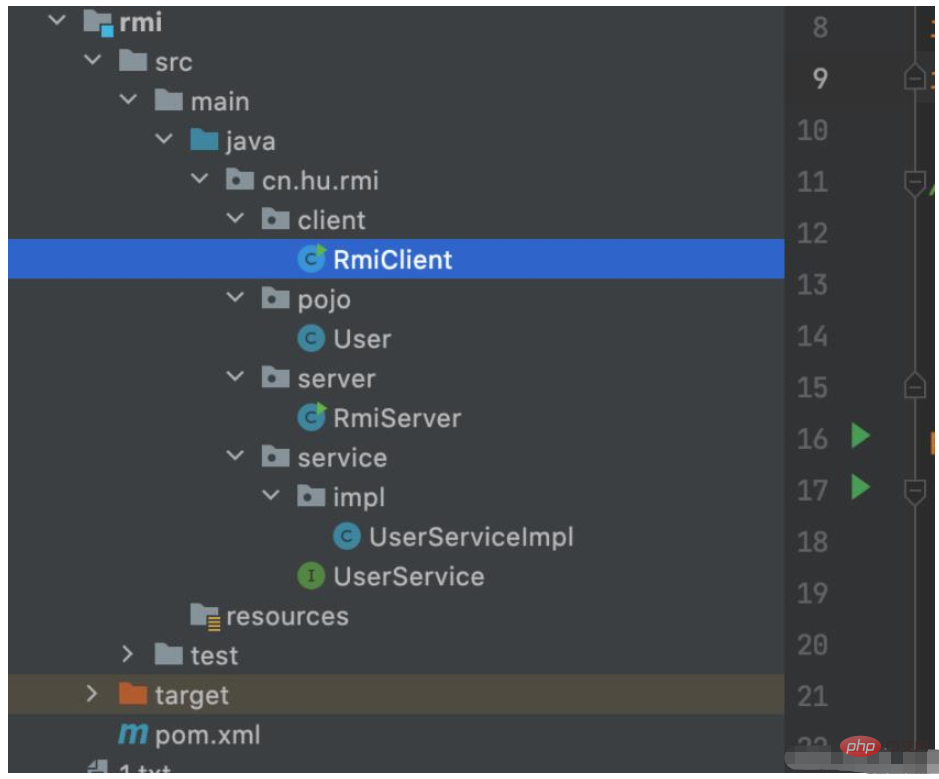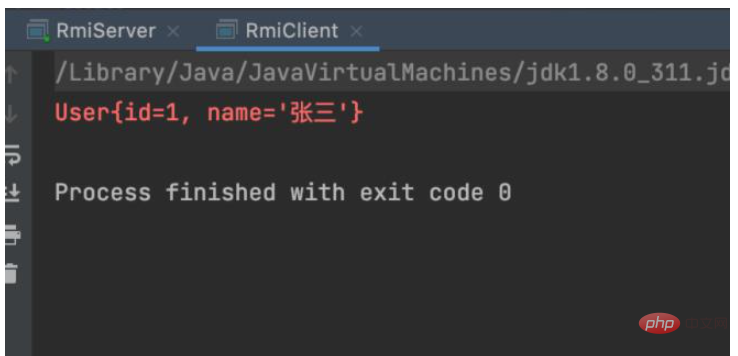How to call java remotely based on RMI
Introduction
Java RMI, Remote Method Invocation (Remote Method Invocation), a Java API used to implement remote procedure call (RPCRemote procedure call), can directly transmit serialized Java objects. Its implementation relies on the Java Virtual Machine, so it only supports calls from one JVM to another.
1. The server generates a registry and binds a port.
2. The server registers the service interface that needs to be published into the registry.
3. Start the service and wait for consumers
4. The consumer obtains the registry based on the IP and port of the server
5. The consumer obtains the service interface that wants to provide services based on the name from the registry
6. The consumer calls the method in the interface to complete the method Call
Environment setup
Create a project module

Create pojo class:
package cn.hu.rmi.pojo;
import java.io.Serializable;
/**
* @Author: hu.chen
* @Description: 因为需要序列化和反序列化,所以需要实现Serializable接口
* @DateTime: 2021/12/26 5:05 PM
**/
public class User implements Serializable {
private Integer id;
private String name;
public Integer getId() {
return id;
}
public void setId(Integer id) {
this.id = id;
}
public String getName() {
return name;
}
public void setName(String name) {
this.name = name;
}
@Override
public String toString() {
return "User{" +
"id=" + id +
", name='" + name + '\'' +
'}';
}
}Create user interface:
package cn.hu.rmi.service;
import cn.hu.rmi.pojo.User;
import java.rmi.Remote;
import java.rmi.RemoteException;
/**
* @Author: hu.chen
* @Description: 需要提供服务的接口需要继承 Remote 并且所有的方法都需要抛出 RemoteException 异常
* @DateTime: 2021/12/26 5:06 PM
**/
public interface UserService extends Remote {
/**
* 所有的方法都需要抛出 RemoteException 异常
* @param id
* @return
* @throws RemoteException
*/
User getUserById(Integer id) throws RemoteException;
}Service provider:
创建userservice的实现类
package cn.hu.rmi.service.impl;
import cn.hu.rmi.pojo.User;
import cn.hu.rmi.service.UserService;
import java.rmi.RemoteException;
import java.rmi.server.UnicastRemoteObject;
import java.util.Map;
import java.util.concurrent.ConcurrentHashMap;
/**
* @Author: hu.chen
* @Description: 所有的实现类都需要继承 UnicastRemoteObject 这个类
* @DateTime: 2021/12/26 5:07 PM
**/
public class UserServiceImpl extends UnicastRemoteObject implements UserService {
private static Map<Integer,User> userMap=new ConcurrentHashMap<>(8);
static {
User user1=new User();
user1.setId(1);
user1.setName("张三");
User user2=new User();
user2.setId(2);
user2.setName("李四");
userMap.put(user1.getId(),user1);
userMap.put(user2.getId(),user2);
}
public UserServiceImpl() throws RemoteException {
super();
}
@Override
public User getUserById(Integer id) throws RemoteException {
return userMap.get(id);
}
}Start and add the implementation class to the registry:
package cn.hu.rmi.server;
import cn.hu.rmi.service.UserService;
import cn.hu.rmi.service.impl.UserServiceImpl;
import java.rmi.RemoteException;
import java.rmi.registry.LocateRegistry;
import java.rmi.registry.Registry;
/**
* @Author: hu.chen
* @Description: 服务端(服务提供者)
* @DateTime: 2021/12/26 5:11 PM
**/
public class RmiServer {
public static void main(String[] args) throws RemoteException {
// 1: 创建注册表对象,之后服务提供者暴露的服务都需要注册到这个注册表中
Registry registry = LocateRegistry.createRegistry(8089);
UserService userService=new UserServiceImpl();
// 将需要提供的service服务注册到注册表中
registry.rebind("userService",userService);
System.err.println("服务提供者启动成功");
}
}Service consumer:
package cn.hu.rmi.client;
import cn.hu.rmi.pojo.User;
import cn.hu.rmi.service.UserService;
import java.rmi.NotBoundException;
import java.rmi.RemoteException;
import java.rmi.registry.LocateRegistry;
import java.rmi.registry.Registry;
/**
* @Author: hu.chen
* @Description: 客户端(服务消费者)
* @DateTime: 2021/12/26 5:18 PM
**/
public class RmiClient {
public static void main(String[] args) throws RemoteException, NotBoundException {
//1: 获取远程的注册表
Registry registry = LocateRegistry.getRegistry("127.0.0.1", 8089);
UserService userService= (UserService) registry.lookup("userService");
User userById = userService.getUserById(1);
System.err.println(userById);
}
}Start the service provider, and then start the service consumer:

The above is the detailed content of How to call java remotely based on RMI. For more information, please follow other related articles on the PHP Chinese website!

Hot AI Tools

Undresser.AI Undress
AI-powered app for creating realistic nude photos

AI Clothes Remover
Online AI tool for removing clothes from photos.

Undress AI Tool
Undress images for free

Clothoff.io
AI clothes remover

AI Hentai Generator
Generate AI Hentai for free.

Hot Article

Hot Tools

Notepad++7.3.1
Easy-to-use and free code editor

SublimeText3 Chinese version
Chinese version, very easy to use

Zend Studio 13.0.1
Powerful PHP integrated development environment

Dreamweaver CS6
Visual web development tools

SublimeText3 Mac version
God-level code editing software (SublimeText3)

Hot Topics
 1386
1386
 52
52
 Perfect Number in Java
Aug 30, 2024 pm 04:28 PM
Perfect Number in Java
Aug 30, 2024 pm 04:28 PM
Guide to Perfect Number in Java. Here we discuss the Definition, How to check Perfect number in Java?, examples with code implementation.
 Weka in Java
Aug 30, 2024 pm 04:28 PM
Weka in Java
Aug 30, 2024 pm 04:28 PM
Guide to Weka in Java. Here we discuss the Introduction, how to use weka java, the type of platform, and advantages with examples.
 Smith Number in Java
Aug 30, 2024 pm 04:28 PM
Smith Number in Java
Aug 30, 2024 pm 04:28 PM
Guide to Smith Number in Java. Here we discuss the Definition, How to check smith number in Java? example with code implementation.
 Java Spring Interview Questions
Aug 30, 2024 pm 04:29 PM
Java Spring Interview Questions
Aug 30, 2024 pm 04:29 PM
In this article, we have kept the most asked Java Spring Interview Questions with their detailed answers. So that you can crack the interview.
 Break or return from Java 8 stream forEach?
Feb 07, 2025 pm 12:09 PM
Break or return from Java 8 stream forEach?
Feb 07, 2025 pm 12:09 PM
Java 8 introduces the Stream API, providing a powerful and expressive way to process data collections. However, a common question when using Stream is: How to break or return from a forEach operation? Traditional loops allow for early interruption or return, but Stream's forEach method does not directly support this method. This article will explain the reasons and explore alternative methods for implementing premature termination in Stream processing systems. Further reading: Java Stream API improvements Understand Stream forEach The forEach method is a terminal operation that performs one operation on each element in the Stream. Its design intention is
 TimeStamp to Date in Java
Aug 30, 2024 pm 04:28 PM
TimeStamp to Date in Java
Aug 30, 2024 pm 04:28 PM
Guide to TimeStamp to Date in Java. Here we also discuss the introduction and how to convert timestamp to date in java along with examples.
 Java Program to Find the Volume of Capsule
Feb 07, 2025 am 11:37 AM
Java Program to Find the Volume of Capsule
Feb 07, 2025 am 11:37 AM
Capsules are three-dimensional geometric figures, composed of a cylinder and a hemisphere at both ends. The volume of the capsule can be calculated by adding the volume of the cylinder and the volume of the hemisphere at both ends. This tutorial will discuss how to calculate the volume of a given capsule in Java using different methods. Capsule volume formula The formula for capsule volume is as follows: Capsule volume = Cylindrical volume Volume Two hemisphere volume in, r: The radius of the hemisphere. h: The height of the cylinder (excluding the hemisphere). Example 1 enter Radius = 5 units Height = 10 units Output Volume = 1570.8 cubic units explain Calculate volume using formula: Volume = π × r2 × h (4
 How to Run Your First Spring Boot Application in Spring Tool Suite?
Feb 07, 2025 pm 12:11 PM
How to Run Your First Spring Boot Application in Spring Tool Suite?
Feb 07, 2025 pm 12:11 PM
Spring Boot simplifies the creation of robust, scalable, and production-ready Java applications, revolutionizing Java development. Its "convention over configuration" approach, inherent to the Spring ecosystem, minimizes manual setup, allo




